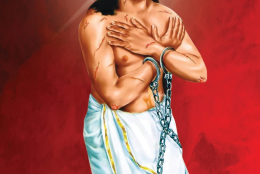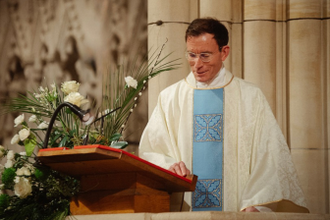Embracing Diversity: Lessons from Interfaith Exposure in India

The group on the interfaith visit, Credit: Joseph Victor Edwin SJ
A group of eight students from the Henry Martyn Institute in Hyderabad recently visited Delhi for an interfaith exposure program, and I was delighted to facilitate the programme.
Our first meeting was with the members of the Centre for Peace and Spirituality (CPS) in Delhi. The Centre was established by the efforts of Maulana Wahiddudin Khan in January 2001. This non-political, non-profit, non-governmental organization aims to showcase the true essence of Islam, which is rooted in peace and spirituality. Maulana Khan, who passed away in 2021, was a highly respected Islamic scholar recognized for presenting Islam in a modern context.
Maulana Khan articulated that peace and spirituality are two sides of the same coin. He defined spirituality as the practice of positive thinking, on an individual level; when this positive mindset radiates throughout society, it transforms into peace. Through the Centre, Maulana Khan aimed to guide individuals toward embracing a positive, God-centered way of life. The members of CPS strive to spread love for God and promote goodwill among all people. Maulana Khan emphasized that Islam did not endorse a confrontational approach and highlighted the importance of respecting diverse beliefs. While acknowledging our differences in faith, he believed that what unites us is our shared ethical outlook as human beings, where reason and faith complement each other. He often reiterated his famous saying: "Follow one (your religion) and respect all (the religions of the world)."
Shaping the Future of the World in Peace: Reflection from CPS, Delhi
One of the fascinating ideas of Maulana Khan about human beings is his/her place in the 'Creation Plan of God (CPG)'. He argued that the CPG do not demand Muslims to establish an ideal society, but rather CPG invites Muslims to live out the essence of human freedom fruitfully. Humans have been granted full freedom of speech and action during their time on Earth, as they are placed here by the Almighty to undergo a test. As part of this trial, individuals possess the freedom to deny God and oppose the messengers of truth. If human freedom were completely withdrawn, it would become possible to establish an ideal society. However, according to CPG, God would never withdraw the gift of human freedom under any circumstances.
Accordingly, Maulana Khan highlighted that, according to divine design, the true purpose of our world is not to create a perfect society but to develop ideal individuals. God is not seeking the formation of a perfect community; instead, He desires human beings to endure challenges and uphold their faith. Individuals face tests through hardships that shape their character. People are granted the freedom to choose between good and evil, and this plan encourages them to use that freedom wisely to earn a place in Paradise.
Maulana Khan taught that a perfect society will not be realized in this life but in the Hereafter, which the Qur'an refers to as Darus Salam, or the Home of Peace. The primary hurdle to forming an ideal society in this world is the presence of rebellious and insolent individuals. In the heavenly society of the Hereafter, all wrongdoers will be separated from the righteous, resulting in a community composed solely of virtuous souls. Only in heaven will it be possible to realize the vision of an ideal society.
As we explore this fascinating concept, it's important to acknowledge that Christians share a common foundation for dialogue with our Muslim brothers and sisters. This foundation is rooted in the human freedom that arises from the inalienable dignity of every person. The Catholic Church emphasizes that human life is sacred and that the dignity of the individual serves as the cornerstone of a moral vision for society. Together, Muslims and Christians can deepen our understanding of the human person.
Muslims may be interested in knowing that the Church speaks of 'the Kingdom of God.' This phrase appears in the Gospels more than 90 times and reflects the new vision for society that Jesus offers. This vision is rooted in principles of freedom, community, and justice. Biblical scholars emphasize that the phrase 'Kingdom of God' is uniquely associated with Jesus, reflecting his distinct sense of mission and his personal encounters with God. Drawing from his profound relationship with God as 'Abba,' Jesus not only embraced this understanding but also encouraged others to see every person as a loving brother or sister. This radical openness that Jesus displayed towards all humanity stems from his deep experience of God as a nurturing Father. This naturally leads us to acknowledge everyone around us as brothers and sisters, deserving of our acceptance and love.
Sufis: Religion of the Heart
Our next destination was the shrine of Hazrat Nizamuddin Aulia, one of the most renowned Sufi saints in the Indian subcontinent. Sufis - a mystic dimension of Islam - emphasize that love is the key to realizing God, stating that genuine love for God naturally translates into love for humanity.
Muhammad Nizami Saheb, a spiritual guide at the shrine, emphasised that Sufism is fundamentally a religion of the heart. Sufis respond to hatred not with anger, but with love and compassion. He also highlighted that the hadith of Prophet Muhammad teaches the importance of forgiveness and reconciliation, which holds even greater significance today than they did in the Prophet's time. Sufis do not discriminate against one another; rather, they prioritize serving those in need, considering it as the fastest path to heaven. Sufis emphasise that ethical praxis is key to the life of any Muslim. Sufis deeply embrace the teachings of the Prophet Muhammad and go beyond the surface in their understanding of the Qur'an. A long conversation followed by a meal was a wonderful experience.
Many Lessons: From A Closed View to an Open View
The students and I recognised that this engagement helped us to understand our Muslim brothers and sisters better. Frequently, we encounter the notion that Islam is a singular, unchanging entity that fails to adapt to new realities. However, our interactions with members of CPS, our Sufi teacher and other devotees at the shrine revealed to us that Muslims are diverse in their understanding and practice of Islam, and we felt delighted to recognise that many Muslims are forward-thinking. Muslims and Christians can share values that intersect with their religions and cultures. Anyone interested in Christian-Muslim relations can glean valuable insights from such experiences. The students pointed out that they learned from these interactions:
• Islam should not be viewed as a barbaric, irrational, or primitive faith, as it is often misrepresented in the media, but rather as a unique tradition that is different, not deficient.
• Islam ought to be seen not as a violent or aggressive religion embroiled in a clash of civilizations, but as a potential ally in collaborative efforts to tackle common issues.
• Islam should not be viewed as a political ideology, but as a genuine religious belief that is lived by its followers in depth, often not seen or observed by others.
From these two encounters, I drew a clear conclusion: "Authentic believers from different faiths can learn from each other and together they can shape a more peaceful future for all".


















